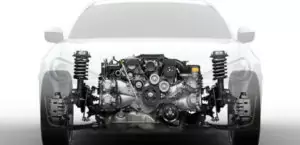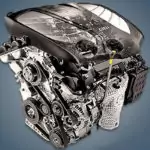The 2.2-liter diesel engine Hyundai D4EB or 2.2 CRDi was produced from 2005 to 2010 and was installed only on the second generation of the Santa Fe model and the fourth generation of the Grandeur. From 2002 to 2004, a similar unit was installed in small batches on the Hyundai Sonata EF sedan.
In 2005, the second generation of the 2.0-liter D4EA diesel engine was released, but the new Hyundai Santa Fe in the CM body needed a more powerful power unit and this is how the 2.2-liter D4EB diesel engine appeared, which essentially differed only in piston diameter. Structurally, it has a cast-iron cylinder block, a Bosch CP3 common rail fuel system, an aluminum head with a single 16-valve camshaft and hydraulic lifters, a timing belt drive, an MHI TF035HL variable geometry turbocharger and an intercooler. The first modification developed a power of 150 hp and 335 Nm of torque.
In 2006, a second modification of the 2.2-liter diesel engine appeared, sometimes called the D4EB-F, which developed a little more power of 155 hp and 343 Nm of torque. This engine can be found under the hood not only of the Santa Fe crossover, but also of the Grandeur sedan.
The D family also includes diesels: D3EA and D4EA.
The engine was installed on:
- Hyundai Grandeur 4 (TG) in 2006 – 2010;
- Hyundai Santa Fe 2 (CM) in 2005 – 2010.
Specifications
| Production years | 2005-2010 |
| Displacement, cc | 2188 |
| Fuel system | Common Rail |
| Power output, hp | 150 – 155 |
| Torque output, Nm | 335 – 343 |
| Cylinder block | cast iron R4 |
| Block head | aluminum 16v |
| Cylinder bore, mm | 87 |
| Piston stroke, mm | 92 |
| Compression ratio | 17.3 |
| Hydraulic lifters | yes |
| Timing drive | belt |
| Turbocharging | yes |
| Recommended engine oil | 5W-30, 5W-40 |
| Engine oil capacity, liter | 6.5 |
| Fuel type | diesel |
| Euro standards | EURO 4 |
| Fuel consumption, L/100 km (for Hyundai Santa Fe 2008) — city — highway — combined |
9.6 6.0 7.3 |
| Engine lifespan, km | ~400 000 |
| Weight, kg | 201.4 |
Disadvantages of the Hyundai D4EB engine
- This power unit does not tolerate low-quality fuels and lubricants, and also requires strict adherence to the maintenance regulations and the replacement of its consumables. Otherwise, you risk facing wear on the camshaft cams or valve rockers.
- This diesel engine has a very reliable Common Rail Bosch CP3 fuel system, but low-quality diesel fuel wears out quickly and then nozzles begin to pour. Even with one faulty injector, cases of piston destruction were recorded here.
- According to the regulations, the timing belt is changed every 90 thousand km, but sometimes it doesn’t go that much, and since its replacement is complicated and expensive, the owners prefer to drive to the last. The belt can also break when the water pump wedges, and when it breaks, the valves bend.
- Not a very large resource for this diesel engine are glow plugs and their relays, crankshaft damper pulley, drive belt tensioner and turbine regulator rod. Also, the intercooler boost pipe regularly flies off and the EGR valve quickly clogs.






